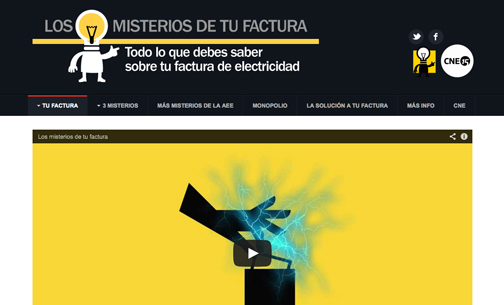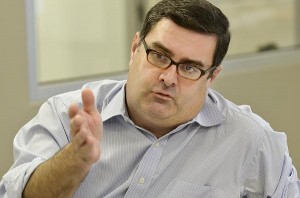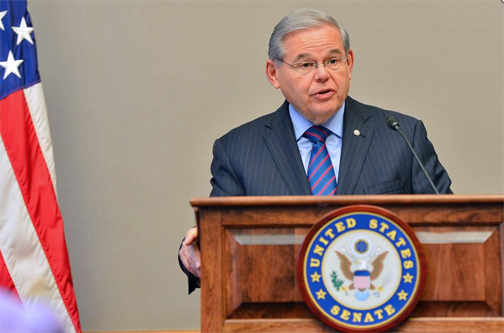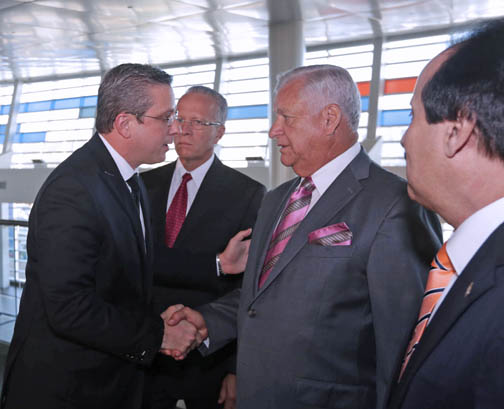CNE supports independent energy regulatory board


The CNE launched www.losmisteriosdetufactura.com, a website that promises to solve the “mystery of the monthly bill” and teach consumers “everything they need to know about their electricity bill.”
The Center for a New Economy expressed its support Wednesday of the creation of an independent energy regulatory board to “rigorously oversee” the Puerto Rico Electric Power Authority’s operations, to spur an improvement in the grid and a reduction in electricity costs passed on to consumers.
Among its responsibilities, the proposed board would be in charge of regulating the island’s electricity market, guarantee that rates are “fair and reasonable,” watch out for service quality and reliability, spur long-term planning, and promote the integration of new technologies at the lowest possible investment to satisfy long-term electricity demands, said Sergio Marxuach, the CNE’s public policy director.
The independent entity would ideally also have to approve long-term capital investments and support the integration of renewable energy producers.
“That board would have to promote the implementation of measures to increase power efficiency and reduce demand. It would also have to reduce PREPA’s environmental footprint, and greenhouse gas emissions,” he said. “PREPA is Puerto Rico’s largest polluter.”
The CNE’s analysis is directly related to a proposition by the current administration to create this independent body to oversee PREPA, whose responsibilities would fall under the Puerto Rico Telecommunications Regulatory Board — something Marxuach said is a mistake.
“The complexity of the market and power system requires the full-time attention of a regulator body with all the necessary resources to effectively oversee it,” he said. “So, we suggest that energy is not added to the TRB’s area of responsibility.”
Gov’t proposals ‘shy and inadequate’
This not the first time the CNE has proposed the concept of creating an independent body to oversee PREPA. The think-tank brought up the need in 2005, submitting proposals that drew attacks from opposing groups, CNE President Mike Soto-Class said Wednesday.
“I think the government’s proposals now are shy and inadequate. They’re not going to solve anything, and we’re disappointed with what has come out of La Fortaleza so far,” he said. “It’s nothing different from what we’ve been hearing during the past 10 years.”
Meanwhile, Marxuach pointed out that creating an independent regulatory body neither implies privatizing electricity production, nor opening the market to competition.
“Regulation is a legal mechanism to oversee public and private entities, protect the public from potential abuse and impose a discipline of accountability,” he said.
PREPA, he said, is a self-regulated monopoly with the power to pass all of its expenses and costs off to its customers, thus having no incentive to be efficient. Furthermore, PREPA’s current governing board also regulates Puerto Rico’s electricity market, resulting in a “clear conflict of interest.”
“This has enabled various stakeholders, such as suppliers, political parties, grantees, unions, bondholders, and those with political connections to come together to extract benefits from PREPA at the expense of the rest of the people of Puerto Rico,” he said.
PREPA has been losing money consistently for the past three fiscal years, eroding liquidity to the point that is has had to borrow to meet its obligations, including its multi-million dollar debt service payments.
“Everything points to the fact that PREPA will have to change the way it operates, if it wants to survive. However, it cannot be sold or privatized right now, precisely because it’s on the edge of insolvency,” Marxuach said. “Any potential buyer would likely offer well below PREPA’s $10 billion debt. In other words, the government would have to give it away.”
Solving the mystery
The CNE’s assessment of PREPA’s situation also included its effect on consumers, who month after month get clobbered with high monthly bills that are hard to understand, think-tank officials said.
To address that, the nonprofit launched www.losmisteriosdetufactura.com, a website that promises to solve the “mystery of the monthly bill” and teach consumers “everything they need to know about their electricity bill.”
The website offers explanations for what they identified as the “three mysteries:” 1) the fuel charge formula, an unexplained component of the bill that often exceeds actual consumption; 2) power purchase charges, for which PREPA uses another formula to charge consumers for electricity the corporation sells to private companies that produce energy from coal, gas, sun and wind; and 3) the final blow — the reality that about 33 percent of the consumer’s monthly bill goes to pay for fees hidden in those formulas.
“If you pay $3,000 a year for electricity, you’re paying $1,000 in hidden charges,” the website says. “In five years, PREPA has charged customers $5 billion in additional fees that have nothing to do with power consumption, or fuel or energy purchases.”
The CNE’s goal is to educate the public about their bills and coordinate efforts to pressure the legislature to act on the PREPA situation, Marxuach said.












